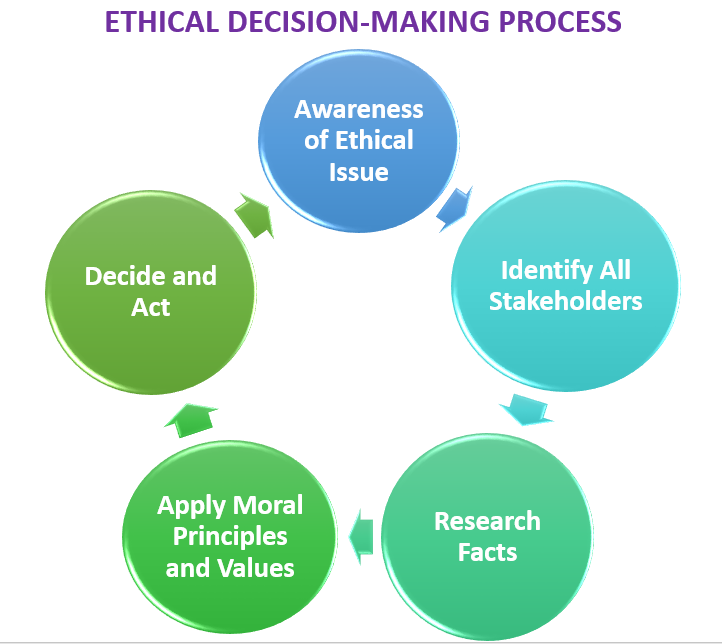Business ethics decision-making is critical in today’s complex corporate landscape, where leaders regularly grapple with ethical dilemmas that blur the lines between right and wrong. Renowned business ethicist Joseph Badaracco emphasizes the importance of ethical decision making as a strategic necessity for executives. As we evaluate business ethics strategies, it becomes evident that the spectrum of ethical challenges has expanded, raising the stakes for gray area decisions that require careful navigation. The implications of these decisions can influence not only a company’s reputation but also its legal standing. In this engaging discourse, we delve into effective approaches for complex decision analysis, equipping leaders with the tools to make informed and ethical choices in an increasingly complicated business environment.
Navigating the intricacies of ethical choices within the business realm has never been more vital. Executives and managers face a plethora of challenges that encompass moral philosophy and the practical realities of adhering to business ethics. The landscape of ethical dilemmas has evolved, with more situations falling into ambiguous gray areas that demand nuanced understanding and savvy judgment. As stakeholders increasingly shape the dynamics of corporate responsibility, understanding ethical frameworks and decision-making processes becomes paramount. By honing in on strategies that prioritize responsible and pragmatic outcomes, professionals can adeptly address the ethical complexities that define modern business practices.
Understanding Business Ethics Decision-Making
Business ethics decision-making involves navigating complex moral landscapes that business leaders encounter daily. This has evolved significantly over the past few decades, as outlined by Joseph Badaracco, a professor of business ethics at Harvard. Unlike in the past, where ethical frameworks were often taught through lofty moral philosophies, contemporary ethics education focuses more on the application of ethical principles to real-world situations. Executives are now faced with multifaceted dilemmas that require them to analyze various stakeholders’ interests while considering legal implications. This evolution reflects a broader understanding of how interconnected businesses have become, requiring leaders to take a more nuanced approach to decision-making.
Today’s business leaders must also contend with rapid technological advancements and their ethical implications. Issues like AI and automation challenge traditional business models and create ethical gray areas that require diligent consideration. When faced with these challenges, leaders must not only identify the facts but also account for their moral responsibilities towards employees, customers, and society at large. As a result, the decision-making process is critical and reflective, guiding leaders to define what’s right in complex situations.
Navigating Gray Area Decisions in Business
Gray area decisions pose some of the most difficult challenges in business ethics. Unlike straightforward legal dilemmas, gray areas require a more subjective analysis, often involving conflicts between different moral obligations. For instance, a company might grapple with the decision to cut costs that affect staff versus the need to maintain profitability for shareholders. Joseph Badaracco emphasizes that the ability to navigate these gray areas effectively hinges on a leader’s personal judgment and ethical standards. It involves an in-depth evaluation of facts, risks, and opinions, particularly when legal implications may not be clear.
To sidestep unethical practices in gray area situations, leaders must foster environments where discussion and collaboration thrive. By engaging diverse perspectives and emphasizing ethical discussions among teams, leaders can mitigate cognitive biases that often lead to self-serving decisions. Encouraging transparency and accountability in decision-making processes can help businesses adhere to ethical standards even when the right path is less obvious, making it imperative for companies to prioritize ethical consideration in their strategic frameworks.
The Importance of Ethical Reflection in Decision-Making
Reflective practice has emerged as a cornerstone of effective ethical decision-making. In the context of business, taking time to reflect on decisions not only clarifies thought processes but also allows executives to evaluate their core responsibilities. Drawing insights from his interviews with various executives, Badaracco highlights that executives utilize diverse methods to reflect—from quiet contemplation to discussing dilemmas with trusted advisors. This varied approach signifies the need for decision-makers to explore their motivations thoroughly and understand the broader implications of their choices.
Moreover, reflection allows leaders to confront uncomfortable truths about their decisions and avoid the pitfalls of cognitive dissonance. By explicitly questioning what really matters and what decisions they can live with, executives can cultivate a more responsible ethical framework. This practice goes beyond just making the right choice; it’s about understanding oneself and positioning moral judgment within the dynamic context of business operations.
Strategies for Ethical Decision-Making in Business
Developing a robust business ethics strategy is crucial for solid decision-making in today’s environment. A strategy encompasses identifying core ethical values, educating teams about these principles, and continuously assessing potential ethical dilemmas faced by the organization. Joseph Badaracco suggests that leaders must consistently reinforce the importance of these values throughout the decision-making process, ensuring that employees understand the ethical considerations behind corporate actions. The incorporation of ethics training into executive education is part of this comprehensive strategy, equipping leaders with the tools needed to navigate complex decisions responsibly.
Furthermore, employing frameworks for ethical decision-making, such as analyzing stakeholder interests and considering short-term versus long-term impacts, can guide leaders in articulating their choices. It also promotes a culture of accountability where employees feel empowered to speak up when ethical lines are at risk of being crossed. An ethical framework thus serves as a crucial guideline, allowing businesses to thrive while upholding their moral responsibilities.
Overcoming Cognitive Biases in Ethical Judgments
Cognitive biases can significantly hinder ethical decision-making, often leading individuals to make choices that prioritize personal or company gain over ethical standards. Business leaders must develop awareness of these biases and actively work to mitigate their influence during the decision-making process. By committing to a mindful approach that takes into account the perspectives of multiple stakeholders, managers can ensure that their assessments are more informed and balanced. Regularly challenging assumptions and seeking feedback can provide critical insights that counterbalance inherent biases.
Engaging in collaborative decision-making is one effective way to combat cognitive biases. By fostering an open discussion environment where ethical concerns can be aired safely, leaders can prevent groupthink and ensure that diverse viewpoints are considered. Creating a culture that values constructive dissent enables teams to scrutinize decisions more thoroughly and promotes more ethical outcomes. Ultimately, confrontations with cognitive biases lead to more responsible decision-making practices.
Reflecting on the Role of Stakeholders in Business Ethics
Understanding the role of stakeholders in ethical decision-making is essential for business leaders. Stakeholders include anyone affected by a company’s actions, from employees and customers to investors and the community. Balancing these diverse interests requires a comprehensive ethical strategy that accommodates varying opinions and addresses conflicts transparently. Joseph Badaracco notes that the shifting nature of business relationships complicates this balancing act, urging leaders to consider how their decisions impact all stakeholders involved, thereby broadening their ethical perspective.
Companies that prioritize stakeholder engagement often find themselves facing less ethical backlash and can create stronger relationships within their ecosystems. By establishing clear communication channels with stakeholders, businesses can better understand their concerns and reflect them in their decision-making processes. This stakeholder-focused approach not only reinforces ethical standards but also enhances corporate reputation and fosters long-term success.
The Impact of Technology on Ethical Decision-Making
Technological advancements drastically shape the ethical landscape in which businesses operate. New technologies, such as AI and big data, introduce complex ethical considerations that organizations must navigate carefully. The increased complexity of decision-making, especially regarding privacy, bias, and responsibility, challenges traditional frameworks of business ethics. Joseph Badaracco emphasizes that staying attuned to these technological changes is essential for leaders to maintain ethical integrity while harnessing innovation.
Furthermore, as digital tools continue to affect business operations, ethical decision-making must evolve accordingly. Leaders are tasked with ensuring that technology serves to enhance, rather than compromise, ethical standards. This involves creating ethical guidelines around technology use, emphasizing transparency, and fostering a culture that prioritizes ethical considerations in tech-driven environments. By addressing the implications of technological changes proactively, businesses can navigate the evolving ethical landscape effectively.
Building an Ethical Company Culture
An ethical company culture not only promotes sound decision-making but also enhances employee morale and public perception. Instilling a strong ethical framework throughout the organization is paramount and involves comprehensive training programs, visible leadership commitment, and clear policies that reinforce ethical norms. Joseph Badaracco advises that leaders must embody the ethical principles they promote, setting the tone for their teams and ensuring ethical considerations become ingrained in the organizational fabric.
Moreover, fostering an ethical culture requires continuous monitoring and evaluation of business practices to ensure adherence to established standards. Encouraging feedback and discussion about ethical concerns empowers employees to contribute to a healthy ethical climate. As firms strive to build and maintain an ethical culture, they lay the groundwork for responsible decision-making and sustainable success in an increasingly interconnected and complex business world.
Legal Implications of Ethical Decision-Making
Business decisions often carry significant legal ramifications, making it essential for leaders to understand the intersection of ethics and law. Executives must navigate the complex environment of legal compliance while maintaining ethical integrity. In many cases, adhering strictly to legal standards may not suffice to ensure truly ethical behavior. Joseph Badaracco highlights that the propensity for leaders to exploit legal gray areas can lead to ethical pitfalls, underlining the importance of a robust ethical framework beyond mere compliance.
Equipped with an understanding of legal and ethical norms, business leaders can better support their organizations in making responsible decisions. Training employees to recognize and adhere to both legal standards and ethical principles fosters an environment where compliance is paired with ethical reasoning. This dual focus reinforces the organization’s commitment to integrity and accountability, ultimately leading to better outcomes for the business, stakeholders, and society as a whole.
Frequently Asked Questions
What are the key principles of business ethics decision-making in today’s complex corporate landscape?
Business ethics decision-making today involves understanding ethical principles and applying them to complex situations. It requires evaluating stakeholder interests, navigating gray area decisions, and considering the implications of emerging technologies. Managers must balance ethical accountability while using strategic frameworks derived from ethical decision-making theories, such as utilitarianism and deontology.
How can Joseph Badaracco’s insights on ethical decision making enhance business ethics strategies?
Joseph Badaracco emphasizes the importance of a reflective approach to ethical decision making. By focusing on the specific circumstances of each situation, leaders can better analyze complex decisions and gray areas. His strategies encourage managers to weigh ethical considerations against practical outcomes, fostering sound judgment and integrity in business ethics.
What role do gray area decisions play in business ethics decision-making?
Gray area decisions are critical in business ethics decision-making as they often lack clear right or wrong answers. These situations require managers to exercise personal judgment, consider multiple perspectives, and engage with stakeholders to navigate ethical uncertainties, ensuring decisions are responsible and contextually appropriate.
How do complex decision analysis techniques apply to business ethics?
Complex decision analysis techniques are essential in business ethics as they help decision-makers systematically evaluate the implications of their choices. This analytical approach allows leaders to assess risks, gather expert opinions, and consider stakeholder interests, leading to more informed and ethical business practices.
Why is it important to reflect on ethical responsibilities when navigating business ethics decision-making?
Reflection is crucial in business ethics decision-making as it allows leaders to clarify their responsibilities and the ethical implications of their choices. By pondering what truly matters, executives can better align their decisions with ethical standards and stakeholder expectations, ultimately promoting a more ethical corporate culture.
How can managers effectively avoid cognitive biases in business ethics decision-making?
Managers can avoid cognitive biases in business ethics decision-making by collaborating with diverse teams, challenging personal assumptions, and focusing on objective facts. Engaging in open discussions about ethical dilemmas fosters a comprehensive understanding of the issues, aiding in making responsible and unbiased decisions.
What strategies can be implemented to improve ethical decision-making in a business context?
To improve ethical decision-making, organizations can establish clear ethical guidelines, provide training on ethical frameworks, emphasize accountability, and promote a culture of transparency. Encouraging discussions about ethical dilemmas and providing support resources can significantly enhance business ethics strategies within teams.
How does the evolving nature of business ethics impact ethical decision-making frameworks?
The evolving nature of business ethics, influenced by globalization, technology, and social responsibility, necessitates adaptable ethical decision-making frameworks. Managers must continuously update their approaches to include diverse perspectives, remain compliant with varied legal standards, and consider the broader impacts of their decisions on society and the environment.
In what ways do Joseph Badaracco’s teachings influence ethical leadership in organizations?
Joseph Badaracco’s teachings influence ethical leadership by promoting reflective practices and emphasizing the importance of context in decision-making. His insights encourage leaders to navigate ethical challenges thoughtfully, fostering a commitment to ethical practices that resonate throughout the organizational culture.
What is the significance of ‘hitting pause’ in making business ethics decisions?
‘Hitting pause’ is significant in making business ethics decisions as it allows leaders to reflect on the ethical implications of their choices, collect necessary information, and consider alternative perspectives. This deliberate approach helps avoid impulsive decisions and enhances the quality of ethical decision-making processes.
| Key Point | Details |
|---|---|
| Changing Nature of Business Ethics | Business ethics has shifted from a top-down application of moral philosophy to a bottom-up approach focusing on practical situations and ethical perspectives. |
| Complexity of Decision-Making | Executives face more sophisticated ethical challenges today, with various stakeholders and legal responsibilities complicating their judgment. |
| Spectrum of Ethical Judgments | Good and bad judgments exist along a spectrum; many decisions resemble artistic rather than logical conclusions. |
| Avoiding Cognitive Biases | Collaboration and focused analysis help decision-makers confront their biases and enhance ethical reasoning in gray areas. |
| Reflection in Decision-Making | Many leaders use personal reflection methods, such as exercise or conversation, to clarify their thoughts before making decisions. |
Summary
Business ethics decision-making has evolved significantly, emphasizing the need for executives to navigate a complex landscape of responsibilities and dilemmas. The old approach of strictly applying moral principles has given way to a more dynamic interaction with ethical scenarios. As this landscape continues to change, leveraging practical experiences and reflective practices becomes essential for leaders to make sound decisions that consider both legal compliance and ethical integrity.







